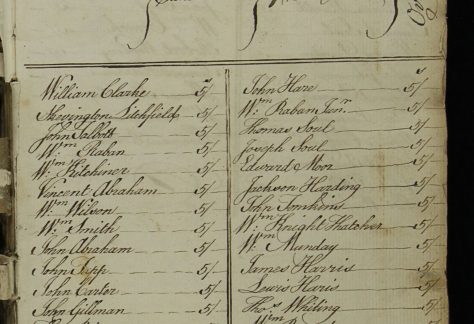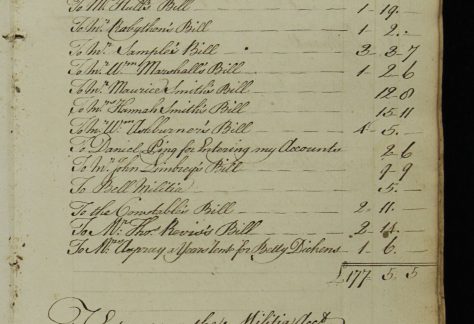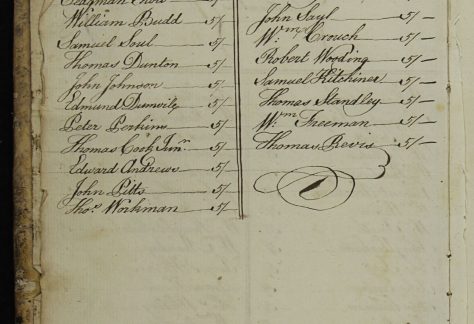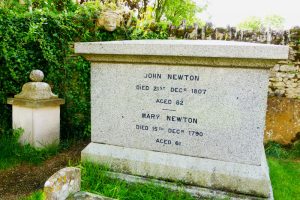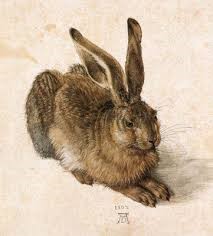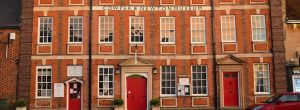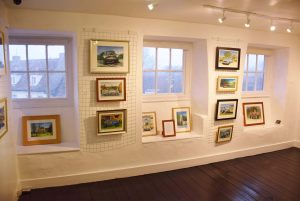During the 18th century the regular army was constantly under strain from actions abroad such as the wars in North America and combatting Napoleon’s expansion plans in Europe. It became the role of the Militia to defend the Kingdom from invasion and release army units for service abroad. Their role also included keeping the peace in England such as during the riots in England over high food prices.
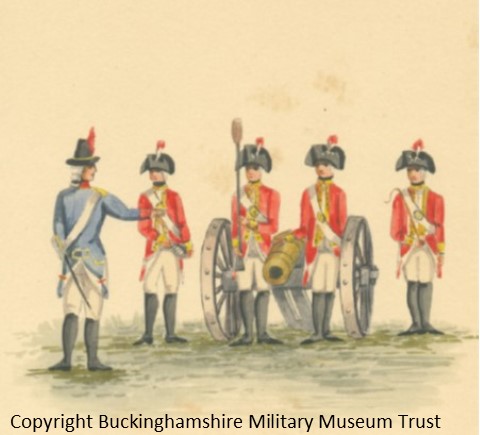
The Militia had been reconstituted in 1757, following the Jacobite rebellion of 1745 and each parish had to provide a small number of able-bodied men for militia training. At this time, it was the responsibility of appointed Overseers to arrange to cover the cost of the local militia.
‘Militia men’ would be aged between eighteen to forty-five and chosen by ballot. Clergy, teachers, medics, apprentices and peers, or men having several children under ten years of age could get exemptions from being drafted in the Militia. You could also avoid service by paying a £10 fine or by finding a substitute. This meant that, in practice, militia men tended to be manual workers who would probably be single and illiterate.
The list of men was drawn up by the local Constable and each man chosen would serve for three years and do twenty days training each year between May and October.
In 1759, in Buckinghamshire, 93% of all farmers found means of avoiding service. The quota for the year was supposed to be five hundred and sixty men, but only two hundred and thirty-eight served. Of these fifty were from the ballot list and four were volunteers.
In 1797, for the three Newport Hundreds, only seven of the one hundred and thirteen men were from the ballot list and at least sixty-eight were labourers.
The first evidence the Museum has within the Olney Poor Law records is from 1760. They show the cost of a horse and charges for going to Newport for militia business being 2/6d and going to Broughton costing 3/0d. The militia men’s children also attracted a payment of 6d. Mr Todd was paid 5/0d for bringing the Militia money, and for fetching the militia on a Sunday 2/0d.
The rules for exemption were changed in 1782 so in April that year the Churchwardens and Overseers of Olney agreed that in exchange for a payment of five shillings each, payees would be exempt from serving in the Militia or would find substitutes for them. There is a list of over one hundred named residents who each paid five shillings.

Militia men would be billeted in towns around the country where they were housed in inns and livery stables. They tended to have a lot of time on their hands and got up to all sorts of mischief. William Cowper describes one incident for us in his letter to his friend William Unwin on the 27th Feb 1781.
Cowper came back to this again in his poem ‘The Task, published in 1785, where he describes how the ploughboy, as a ‘child of nature, without guile’ learns ‘To swear, to game, to drink;’ and so breaks his mother’s heart and becomes a ‘pest where he was useful once;’ * see below
Men from Olney served in the Militia forces for Buckinghamshire, Northamptonshire, and Bedfordshire. In Buckinghamshire, they came from as far away as Amersham, West Wycombe, and Princes Risborough. In Northamptonshire, they came as far as Daventry and in Bedfordshire from Ampthill and Luton.
In February 1794, the three counties paid varying wages for twenty-seven weeks’ service. For example, records show:
Buckinghamshire Militia paid Thomas Guttridge 5/10d per week, William Smith 2/4d per week, and Samuel Boswell, Samuel Roberson, William Kitchener, Thomas Bayes and Isaac Boon 1/2d per week. Bedfordshire Militia paid Benjamin Stow 2/4d per week, and William Redbourn and Thomas Ward 1/2d per week.
Northamptonshire Militia paid Thomas Watson 4/8d per week, Thomas Marshall, Thomas Kitchener, Thomas Hinde and James Fox 3/6d per week, Henry Lett, and Thomas Marriott 1/2d per week, Middlesex Militia paid Ann Boswell 15 weeks at 1/6d per week.
Militia men’s wives and children were also supported:
March 1810 Buckinghamshire Militia: John Marshall for John Carpenter of West Wickham from October 1808 to April 1810 and wife and child £12/13/8d, William Scott for Thomas Edwins of Great Horwood and wife and 2 children April 1809 to April 1810, £8/4/4d, Thomas Gates for Jonathan Wallington of Amersham and child April 1809 to April 1810, £3/16/2d, Thomas Kingstone for Thomas Pinger of Princes Risborough and wife June 1809 to April 1810, £3/1/6d
Bedfordshire Militia: James Stowe for Thomas Cooke of Ampthill £1/16/0d to support his wife from November 1809 to April 1810
Northamptonshire Militia: William Watts for John Abraham’s daughter’s husband £7/12/4d for April 1809 to April 1810. James Brittain’s wife received £8/11/10d for the period April 1809 to April 1810.
‘Tis universal soldiership has stabbed
The heart of merit in the meaner class.
Arms, through the vanity and brainless rage
Of those that bear them, in whatever cause,
Seem most at variance with all moral good,
And incompatible with serious thought.
The clown, the child of nature, without guile,
Blest with an infant’s ignorance of all
But his own simple pleasures …
Is balloted, and trembles at the news:
Sheepishly he doffs his hat, and, mumbling, swears
A bible-oath to be what’er they please,
To do he knows not what. The task performed ‘
That instance he becomes the sergeant’s care,
His pupil and his torment, and his jest.
His awkward gait, his introverted toes,
Bent knees, round shoulders, and dejected looks,
Procure him many a curse, By slow degrees,
Unapt to learn, and formed of stubborn stuff,
He yet by slow degrees puts off himself,
Grows conscious of a change, and likes it well:
He steps right onward, martial in his air,
His form and movement; is as smart above
But with his clumsy port the wretch has lost
His ignorance and harmless manners too!
‘To swear, to game, to drink; to show at home
By lewdness, idleness, and sabbath-breach,
The great proficiency he made abroad;
To astonish and to grieve his gazing friends,
To break some maiden’s and his mother’s heart;
To be a pest where he was useful once;
Are his sole aim, and all his glory, now!’
The Task Book IV William Cowper
Further Reading & Research:
Buckingham Military Museum Trust website
Centre for Buckinghamshire Studies – Bucks Soldiers

